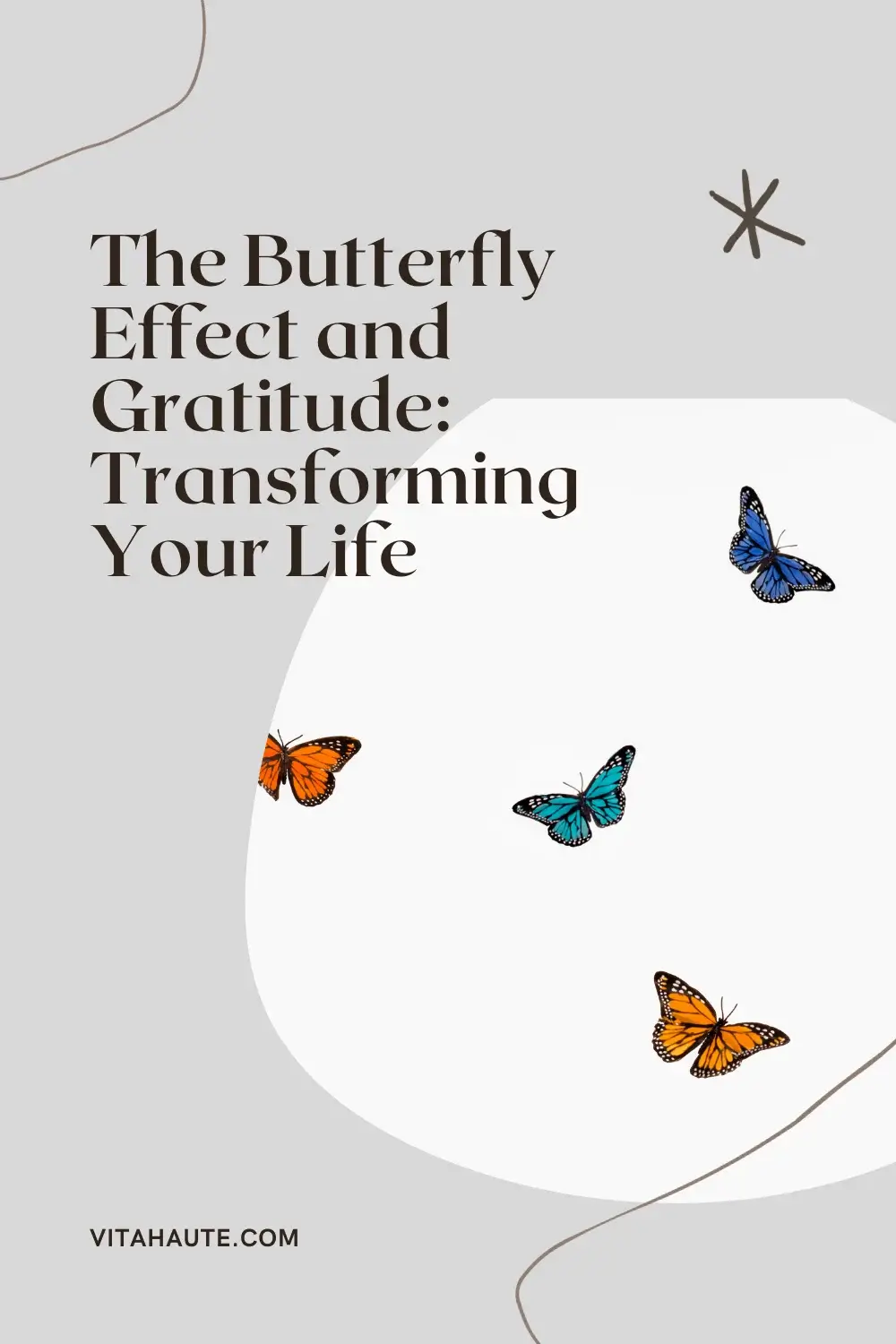Today we’re going to talk about a topic that is a favorite of many self-help books, and that is the butterfly effect. What is the butterfly effect, you may ask? The butterfly effect refers to events, actions, or choices that we make that can have drastic consequences for something else far away. Say for instance you often take a certain bus route but on a particular day you decided on a different route. So you get on the train and you get to meet someone, you hit it off, and before you know it you’re both friends for life. The question then that you would ask yourself is, “Would I have met that person had I taken a different route?” This is a fascinating question, and one that continues to change your perception and perspective of not only the world but your current situation. The reality is that we are going to face trouble from time to time, but it is through these hardships and travails that our most precious doors open.

This post contains affiliate links. Please read our disclosure.
Edward Lorenz and the Origin of the Term ‘Butterfly Effect’
Edward Lorenz, a mathematician and meteorologist, made significant contributions to the development of the butterfly effect concept. He observed that small changes in initial conditions can have profound impacts on the outcome of complex systems, using the example of a butterfly flapping its wings potentially influencing the formation of a tornado. This discovery led to the coining of the term “butterfly effect.”
Lorenz’s groundbreaking work in the field of chaos theory revolutionized our understanding of how seemingly insignificant actions or events can trigger far-reaching consequences. He demonstrated that even minor perturbations can cause significant divergence in the behavior of dynamic systems over time.
His research in meteorology unveiled the interconnected nature of atmospheric processes, highlighting the sensitivity of weather patterns to initial conditions. By showing that a butterfly’s wings could have implications for weather systems thousands of miles away, Lorenz emphasized the complexity and inherent unpredictability of natural phenomena.
The concept of the butterfly effect has since permeated various fields beyond meteorology, influencing disciplines such as physics, mathematics, biology, economics, and social sciences. It has become a powerful metaphor for illustrating the sensitivity of complex systems to initial conditions and the challenges of long-term prediction.
Lorenz’s work not only contributed to scientific advancements but also sparked broader discussions about determinism, causality, and the limits of predictability in the natural world. His legacy continues to inspire further research and exploration into the intricate dynamics of complex systems and their underlying mechanisms.
Edward Lorenz’s pioneering research on the butterfly effect fundamentally changed our understanding of how small actions and variations can have significant impacts on complex systems. His observations and mathematical models have left a lasting impact on diverse fields and have opened new avenues of inquiry into the intricate workings of our interconnected world.
Recognizing and Applying the Butterfly Effect
How can we recognize the butterfly effect in our life and apply it so that we reap enormous benefits? Gratitude offers many benefits to our health. I think that we could all start by acknowledging that things will not always go the way that we had planned. This is an important step because things can go wrong at any moment, during our planned activities. But if we realize that sometimes things happen for a reason, so to speak, then we are well on our way to opening ourselves to the benefit.
Finding Opportunities in Challenging Times
Covid has certainly thrown a monkey wrench in the plans of many. Yet, how many wonderful stories we’ve heard of someone who has been given an opportunity because of the virus, or the many wonderful relationships that have blossomed. If we realize that bad things can lead to good things, then we will never again have to worry about whether something is not going as we had hoped.
Take Jennifer, who lost her house in life savings during the Pandemic. But this did not crush her spirit. She continued to pursue her dreams, one of which was to visit a picturesque part of the country located not too far from her parents’ home. Shortly after she lost her job, she moved in with her parents. She not only took it upon herself to start exercise and as a consequence became healthier, but she realized the dream of spending more time in this part of her parents’ town, where she’d passed through before yet had never fully experienced. Then, six months into the pandemic, she met Timothy, became good friends with her and had his own stories of tribulation during these challenging times. They are still good friends as of this day, and are doing as much as they can to try to help others realize their fullest potential by connecting them with nature and family.
Another way we can be grateful for the things that may have not occurred in the way that we had hoped is to ask ourselves, did this unfortunate event–the death of a family member, or friend, the loss of a job, or the start of the pandemic–lead to better and bigger opportunities? Perhaps it has not as of yet, but that doesn’t mean that it won’t occur in the future. Sometimes we just have to give a chance for things to turn out in ways that will be grateful for. Time is needed for things to materialize. Don’t give up, smile, and continue to hope for the best.
You can also incorporate affirmations for gratitude into your daily routine is a powerful way to cultivate a more grateful mindset. By repeating positive statements that express gratitude for the blessings in your life, you can shift your focus away from what you lack and toward what you have. Some examples of affirmations for gratitude might include “I am thankful for the abundance in my life,” or “I am grateful for the people who love and support me.” Regularly reciting these affirmations can help you develop a grateful perspective and cultivate a deeper sense of contentment and joy in your everyday experiences.
The Power of Patience and Perspective
We can best achieve our hopes, dreams, and aspirations, if we are in a thankful frame of mind. Look around you. Is there anyone anyone less fortunate than yourself? (This will also give you the opportunity to see where you can help others.) How does your current situation compare with that of others? Are you thankful that a piece of news you saw on TV today bore no negative effect you? Each day, tragedies occur throughout the world. There are many who do not have the means to support themselves, nor food to eat for the day. So ask yourself, shouldn’t I be glad that I’m not in these types of situations?
One way to never regret a decision or bad situation that has transpired is to think backwards. Backwards, you might ask? Yes. Here’s what we mean. Whenever something bad happens you ask yourself, did this also actually prevent something else back from occurring? And the answer can often be yes. For example, say you went to an interview and were not offered the job. Not something to celebrate, I would say. However, did this rejection perhaps lead to another opening? Did you as a result of not having been selected for the job seek out employment in another field? And maybe that new job that you got can lead to better opportunities. So you see, we cannot always complain or begrudge the bad moments, as they often lead to better opportunities.
And it may not be right away. One of the best ways of having patience or cultivating patience is to ask yourself simply, what is going to happen if I become impatient question and the answer is usually that thing that you are waiting for and are anxious about, it’s something that will not come any closer if you start worrying or impatiently hoping for it. And as with anything in life the more you practice the better you become. So try to cultivate patience today as you empire power yourself with the idea of the benefits of the butterfly effect.
Benefits of Being Grateful You Never Knew Existed
Gratitude is a powerful tool that can transform your life for the better. By taking just a few minutes each day to reflect on the things we’re grateful for, we can shift our perspective and cultivate a more positive outlook. And the best part? Practicing gratitude is completely free and accessible to anyone, no matter their circumstances.
Research has shown that cultivating gratitude can have a host of benefits. It can improve our physical health by reducing stress, lowering blood pressure, and improving sleep quality. Additionally, it can have a positive impact on our mental health by reducing symptoms of depression and anxiety, increasing resilience, and promoting feelings of happiness and contentment. But that’s not all–gratitude can also improve our relationships with others by fostering trust, strengthening connections, and enhancing empathy and compassion.
Gratitude Builds New Relationships
Gratitude is essential in building new relationships. When we show appreciation to others, it makes them feel valued and respected. People are more likely to communicate and work toward a positive relationship when they feel appreciated. Practicing gratitude can help you create a lasting impression by thanking others for even the smallest things. You can thank your boss for a job well done or your employees for their hard work. By doing so, you open up new opportunities for success and growth in your personal and professional life.
Gratitude Improves Physical Health
Gratitude can have a significant impact on your physical health. When we focus on positive thoughts, we attract more positivity into our lives. By practicing gratitude, you can train your mind to focus on the good things in life, which can lead to a noticeable improvement in your physical health. Gratitude can make your body feel light and satisfied, and it can even release hormones that make you feel happy. By cultivating a grateful attitude, you can build stronger bonds with your friends, family, and acquaintances.
Gratitude Reduces Stress
Gratitude can also significantly reduce stress in our lives. When we show appreciation to others, we feel a sense of relief and happiness. The stresses of excessive workload and intense relationships with coworkers can be alleviated by taking the time to thank one another. Practicing gratitude can create a positive work environment, where employees feel appreciated and valued.
Gratitude Improves Mental Health
Gratitude can improve our mental health by adding a sense of satisfaction and relaxation to our lives. When we express gratitude, we feel acknowledged and appreciated. Others will start to recognize your attitude, and you may even be recommended to others for your positive behavior. Gratefulness can make a significant difference in our lives, and it can be likened to meditation in its ability to relax our minds and prepare us for a fresh start. By cultivating a grateful attitude, you can become a happier, more contented person.
Gratitude Increases Resilience and Positive Thinking
When we experience difficult situations, it can be easy to get stuck in negative thought patterns and feel overwhelmed by negative emotions. However, by focusing on the good things in our lives, we can shift our attention away from the negative and find positive aspects of our situation. This can help us to feel more empowered and less helpless, and can improve our ability to cope with adversity.
There is a growing body of research supporting the idea that practicing gratitude can increase resilience and positive thinking. For example, a study published in the Journal of Positive Psychology found that people who practiced gratitude regularly had higher levels of positive emotions, were more satisfied with their lives, and had lower levels of depression and stress than those who did not practice gratitude.
Gratitude Enhances Empathy and Compassion
The practice of gratitude can enhance our ability to empathize and connect with others on a deeper level. By acknowledging the positive things in our lives, we become more aware of the struggles and challenges faced by others. This awareness can help us to develop a greater understanding and appreciation of the hardships that people around us endure, leading us to become more compassionate and empathetic toward them.
Gratitude also has the potential to improve our relationships with others. When we express gratitude toward someone, it can make them feel valued and appreciated, creating a sense of connection and trust. By being more grateful in our daily lives, we can build stronger bonds with our friends, family, and coworkers. We can also strengthen our relationships with people we may not know well, such as neighbors, service providers, or even strangers on the street. By expressing gratitude toward others, we can create a ripple effect of positivity that can impact not only our own lives, but the lives of those around us as well.
How do you cultivate gratitude?
Cultivating gratitude is a simple but powerful practice. It involves acknowledging the kind gestures of others, no matter how small. Here are some ways to cultivate gratitude:
Start by saying “thank you” to your loved ones, such as your spouse and children. You can also express appreciation to your service providers, like your housekeeper, for their hard work. Even a simple thank you to someone who handed you a cup of coffee can make a difference. Remember to smile when you say it.
You can also show gratitude to your colleagues by thanking them for small favors, like lending you a pen or sharing a file. These small gestures can help you adopt a grateful attitude.
The world has the potential to become a better place if we all embrace the same philosophy of gratitude. While organized religion has often fostered harmonious relationships among people, such an outlook is not exclusive to it. We can all celebrate the notion that we are interconnected in various ways, and that sometimes events unfold for reasons that ultimately benefit the world.
Undoubtedly, we are all interconnected. If each of us takes the responsibility to assist every stranger we encounter, be it through kind words or benevolent actions, this world would thrive with compassion, even amidst the challenges posed by Covid. Once the pandemic subsides, let us reflect on how many of our experiences, initially perceived as unfavorable, have actually led to better opportunities.
The practice of gratitude can significantly enhance our capacity to empathize and forge deeper connections with others. When we acknowledge the positive aspects of our lives, we become more attuned to the struggles and hurdles faced by those around us. This heightened awareness fosters a greater understanding and appreciation for the hardships endured by people in our vicinity, ultimately leading to increased compassion and empathy.
What do you think? Is the butterfly effect a concept that you’re familiar with? Have you applied it in your life, what are situations that you had initially hoped with and or turned out different that actually lead to better opportunities? Share your thoughts in the comments below.


